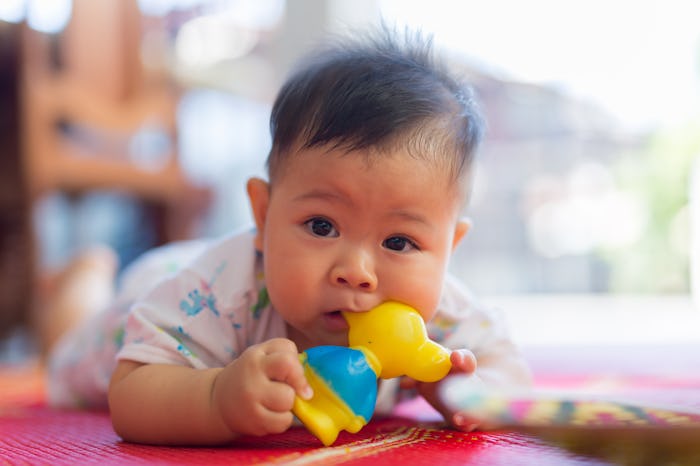Life

If You Think Your Baby Is Sleepier Than Usual While Teething, Here's What's Going On
Parents generally associate teething with crying, pain, and enough long strings of drool to make the monster in Stranger Things say "Ew." But once those 'ol chompers start to poke through, many parents just assume their child's sleep will be disrupted. But is that always the case? Do some babies actually sleep more when they're teething?
Alas — not usually. Natalie Nevares is a pediatric sleep expert and the founder of Mommywise, an agency that helps parents sleep train their children. She says it’s very uncommon for children to sleep more during teething. "However, if your baby has low-grade fevers, which often present with acute teething symptoms, your baby might seem a bit floppy and sleepier while fevers are present."
So, similar to if your child had a cold — they might sleep more. But also like a cold, they might be fussy and uncomfortable and keep everyone up the whole night.
Nevares says teething can have a big impact on some babes, but then others, not so much. And she says how how much teething impacts a child's sleep depends on which teeth are coming in (molars = ow), as well as how many are coming in. And believe it or not, some of how teething affects kids comes down to genetics. "Some babies are hardly fazed by teething and they sleep right through it. Younger sibs with the same DNA often follow the same pattern."
Indeed for some, teething comes with little fanfare. I remember my friend's kid seemed to go to bed one night, sleep straight through, then wake up looking like Donnie Osmond.
Whereas, other babies might seem like teething is totally not going to be a big deal at all, and then — surprise! — they wake up in the middle of the night shrieking like a banshee. When this happens, Nevares says it's usually right before teeth cut through the gums, and is often accompanied by a cold, cough, and/or fever.
Dr. Jennifer Trachtenberg is a pediatrician and SpokesDoctor for the American Academy of Pediatrics (AAP), and she says babies are far more likely to experience sleep disruptions when teething, rather than sleep more soundly or for longer periods.
"Soothing on a pacifier, or chewing on a wet washcloth or a cool teething ring may help to calm and ease the pain," Dr. Jen says. "If the pain is more severe, pain reliever may be given." (Though of course, it's always best to consult your own doctor before going the Children's Tylenol route, just to make sure teething is really the issue.)
Online, there are of course tons of places hocking myriad teething remedies. Parents should take note that the FDA has flat out said benzocaine gels are unsafe. The same goes for teething necklaces and bracelets: the FDA warns they can be choking hazards.
But there are still loads of other options out there! There's good old fashioned Sophie the Giraffe, of course. And even more old-fashioned than that, there's Sophie the Damp Washcloth You Just Pulled Out of Your Bathroom Cabinet at 2am.
Experts:
Natalie Nevares, founder of Mommywise
Dr. Jennifer Trachtenberg, pediatrician and assistant clinical professor of pediatrics at The Icahn School of Medicine at Mount Sinai